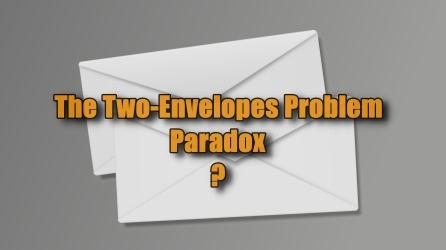You are offered a choice between two envelopes E1 and E2. All that you know about them is that one contains twice as much money as the other. After you have chosen one of the envelopes, you are offered the opportunity to switch the envelope that you have chosen for the other envelope.
Should you keep the first Envelope or change?
Here is a tempting line of reasoning that suggests that you should make this trade. Suppose that you have chosen E1. The amount of money in E1 is $x. Then the amount of money in E2 is either $2x or $0.5x
Moreover—since your choice between the two envelopes was undertaken in complete ignorance of the contents of the two envelopes—you should regard the two possible outcomes as equally likely.
0.5×$2x+0.5×$0.5x=$1.25x
Since the expected utility of trading E1 for E2 is greater than the expected utility of hanging on to E1, you should switch. (1.25 is greater than 1.0 … RIGHT????)
you should switch. 1.25 is greater than 1.0 … RIGHT????
To find out write  for the amount that’s in your chosen envelope. This means that the amount of money in the other envelope is either
for the amount that’s in your chosen envelope. This means that the amount of money in the other envelope is either  or
or  . The probability that it’s
. The probability that it’s  is
is  and so is the probability that it’s
and so is the probability that it’s  . So the expected amount you’ll get for switching is
. So the expected amount you’ll get for switching is
![\[ \frac{1}{2}\left(2x+\frac{x}{2}\right) =x+\frac{x}{4} = \frac{5x}{4}. \]](https://plus.maths.org/MI/906b4e1be841d77cdaee2e99e30966dc/images/img-0001.png)
Since that’s bigger than  , you should swap envelopes. But what if you are given another chance to swap envelopes after you have changed your mind once? By the same reasoning as above you should swap back again. And then, by the same argument again, you should swap a third time, and so on, forever. You end up in an infinite loop of swapping and never get any money at all. What’s wrong with this reasoning?
, you should swap envelopes. But what if you are given another chance to swap envelopes after you have changed your mind once? By the same reasoning as above you should swap back again. And then, by the same argument again, you should swap a third time, and so on, forever. You end up in an infinite loop of swapping and never get any money at all. What’s wrong with this reasoning?
A resolution
Let’s write  for the envelope you picked at first and
for the envelope you picked at first and  for the other one. We write
for the other one. We write  for the amount of money in
for the amount of money in  . Now since we haven’t opened envelope
. Now since we haven’t opened envelope  ,
,  isn’t a fixed amount: it’s a random variable. It can take one of two values: the smaller amount of money that’s hidden in the two envelopes or the larger amount of money. Let’s write
isn’t a fixed amount: it’s a random variable. It can take one of two values: the smaller amount of money that’s hidden in the two envelopes or the larger amount of money. Let’s write  for the smaller amount and
for the smaller amount and  for the larger amount (recall that one envelope contains twice as much money as the other). Since you have picked
for the larger amount (recall that one envelope contains twice as much money as the other). Since you have picked  randomly, there’s a 50:50 chance that
randomly, there’s a 50:50 chance that  contains either of the two amounts. This means that the expected amount of money
contains either of the two amounts. This means that the expected amount of money  in envelope
in envelope  is
is
![\[ E(A) = \frac{1}{2}\left(y+2y\right) =\frac{3y}{2}. \]](https://plus.maths.org/MI/8c9ae8480c676f8b9f510e33feee4f24/images/img-0007.png)
We said above that the expected amount in envelope  is
is

(1)
But recall that  isn’t a fixed amount but can take one of two values. In the case that envelope
isn’t a fixed amount but can take one of two values. In the case that envelope  contains
contains  , envelope
, envelope  contains the smaller amount of money, so
contains the smaller amount of money, so  In the case that envelope
In the case that envelope  contains
contains  , envelope
, envelope  contains the larger amount of money, so
contains the larger amount of money, so  So in formula (1) above, the first
So in formula (1) above, the first  really stands for
really stands for  and the second
and the second  stands for
stands for  . The two
. The two  in the formula are actually different and shouldn’t have been added up to give
in the formula are actually different and shouldn’t have been added up to give 
Substituting the  for the first appearance of
for the first appearance of  in (1) and
in (1) and  for the second gives
for the second gives
![\[ E(B) = \frac{1}{2}\left(2y+y\right)=\frac{3y}{2}. \]](https://plus.maths.org/MI/8c9ae8480c676f8b9f510e33feee4f24/images/img-0015.png)
Thus  so there is no incentive to switch envelopes and hence no paradox.
so there is no incentive to switch envelopes and hence no paradox.


